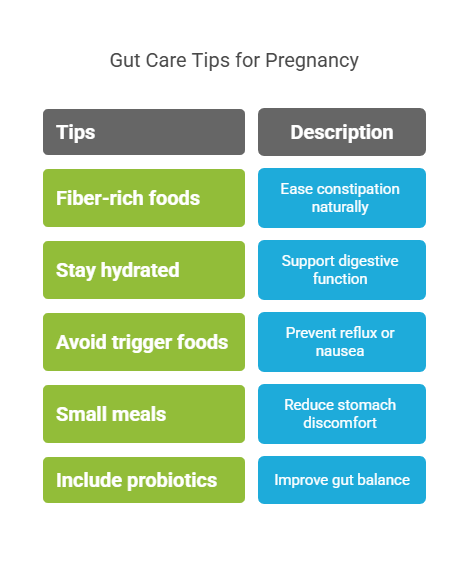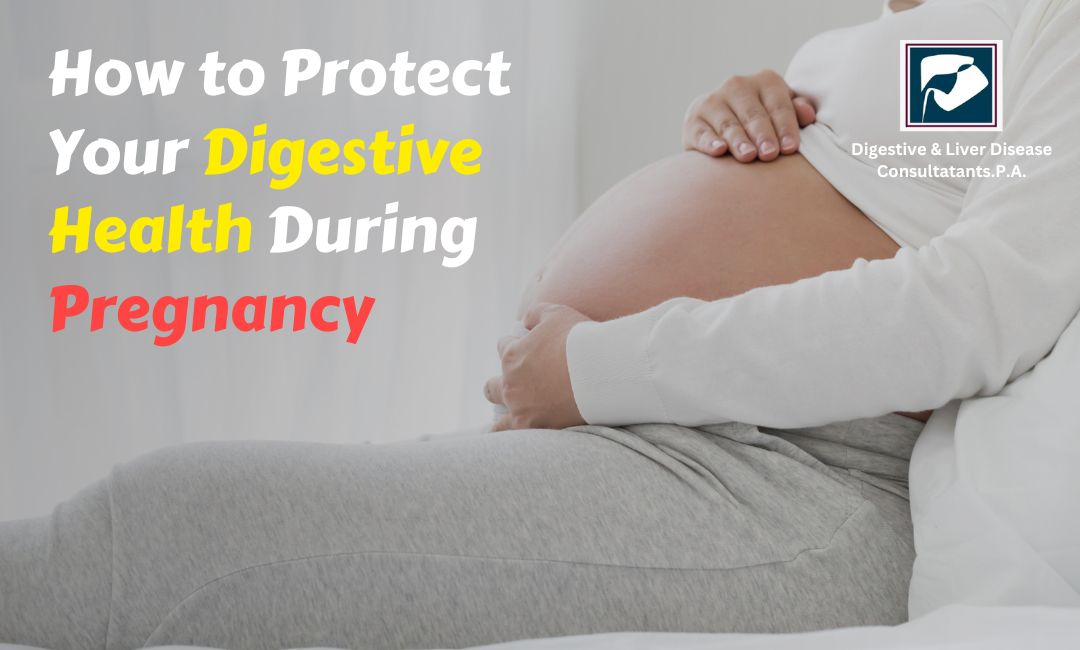Pregnancy is a beautiful journey, but it also brings many changes to a woman’s body—including her digestive system. From morning sickness to heartburn and constipation, digestive problems are very common during pregnancy. These changes can be uncomfortable, but the good news is that there are simple steps you can take to protect your digestive health during this special time.
At Digestive & Liver Disease Consultants, P.A., we understand how important it is to care for both you and your baby. In this blog, we’ll guide you through how pregnancy affects your digestion and what you can do to stay healthy and comfortable throughout each trimester.
How Pregnancy Affects Digestive Health
Pregnancy hormones, especially progesterone, relax the muscles of the digestive tract. This can slow down digestion and lead to symptoms like:
- Heartburn and acid reflux
- Constipation
- Bloating and gas
- Nausea and vomiting (especially during the first trimester)
As the baby grows, your uterus expands and presses against your stomach and intestines, which can make these symptoms even more intense. That’s why it’s so important to care for your digestive system during this time.

Common Digestive Issues During Pregnancy & How to Manage Them
1. Morning Sickness (Nausea and Vomiting)
Morning sickness affects many women, especially in the first 12 weeks of pregnancy. It’s caused by hormonal changes and sometimes a more sensitive stomach.
Tips to relieve morning sickness:
- Eat small, frequent meals throughout the day.
- Choose bland, easy-to-digest foods like crackers, toast, bananas, and rice.
- Sip ginger tea or suck on ginger candies—it’s a natural nausea remedy.
- Stay hydrated by sipping water, electrolyte drinks, or clear broths.
- Avoid strong smells or spicy foods that trigger nausea.
2. Heartburn and Acid Reflux
As the baby grows and pushes up on the stomach, acid can flow back into the esophagus, causing a burning sensation.
How to ease heartburn during pregnancy:
- Eat smaller meals and avoid lying down right after eating.
- Avoid spicy, fatty, and acidic foods (like citrus fruits and tomatoes).
- Don’t drink too much fluid with meals—sip fluids between meals instead.
- Sleep with your upper body elevated using pillows.
- Wear loose-fitting clothes that don’t press on your stomach.
3. Constipation
Slower digestion and hormonal changes can lead to constipation. Iron supplements (commonly taken during pregnancy) may also worsen it.
Ways to relieve constipation:
- Eat more fiber-rich foods like fruits, vegetables, whole grains, and legumes.
- Drink plenty of water—at least 8–10 glasses a day.
- Get regular, gentle exercise like walking or prenatal yoga.
- Talk to our doctor before taking any laxatives or fiber supplements.
4. Bloating and Gas
Bloating and gas are caused by slower digestion and the pressure from your growing uterus.
What helps:
- Eat slowly and chew your food well to reduce swallowed air.
- Avoid carbonated drinks and gas-producing foods like beans, cabbage, and broccoli.
- Stick to smaller meals and avoid overeating.
Healthy Eating Tips for Digestive Comfort
A balanced diet is key to feeling your best during pregnancy. Not only does it support your baby’s growth, but it also keeps your digestive system working smoothly.
Here are some simple diet tips to follow:
Eat small, frequent meals: This helps avoid heartburn, nausea, and bloating.
Stay hydrated: Water helps prevent constipation and supports digestion.
Choose fiber-rich foods: Whole grains, fruits, and vegetables help your bowels move regularly.
Include probiotics: Yogurt and fermented foods can support gut health and reduce constipation.
Limit greasy and fried foods: These can slow digestion and trigger heartburn.
Avoid processed foods: They often lack nutrients and fiber.
Lifestyle Habits That Support Digestive Health
Along with eating well, a few simple lifestyle changes can make a big difference in how you feel during pregnancy.
Walk daily: Gentle movement helps stimulate digestion and reduce constipation.
Practice good posture: Sitting upright after eating can reduce heartburn.
Sleep on your side: Especially the left side—this can reduce acid reflux.
Listen to your body: Eat when you’re hungry and stop when you’re full.
When to See a Doctor
While most digestive issues during pregnancy are normal, some symptoms should never be ignored. If you experience any of the following, talk to your doctor right away:
- Severe or long-lasting vomiting
- Blood in your stool
- Intense stomach pain or cramping
- Inability to have a bowel movement for several days
- Severe heartburn that doesn’t improve with diet changes
How Digestive & Liver Disease Consultants, P.A. Can Help
At Digestive & Liver Disease Consultants, P.A., we care deeply about your health and your baby’s well-being. Our expert gastroenterologists understand how pregnancy can affect digestion and are here to help you manage symptoms safely and effectively.
We specialize in diagnosing and treating a wide range of digestive and liver conditions, including issues that may arise or worsen during pregnancy. Our team works closely with your obstetrician to provide coordinated care that keeps you and your baby healthy.
Whether you’re dealing with stubborn constipation, painful heartburn, or nausea that just won’t go away, we’re here to help with compassionate and personalized care.
Conclusion
Digestive discomfort is a common part of pregnancy, but it doesn’t have to take over your life. With the right nutrition, hydration, and lifestyle habits, you can support your digestive health and enjoy a more comfortable pregnancy.
If you’re struggling with digestive problems during pregnancy, don’t suffer in silence. Contact the team at Digestive & Liver Disease Consultants, P.A. for expert support. We’re here to help you feel better, so you can focus on the joy of your growing family.






